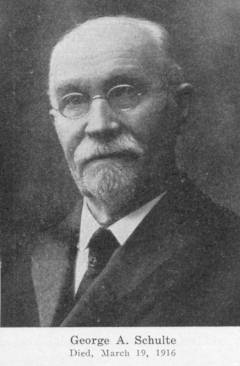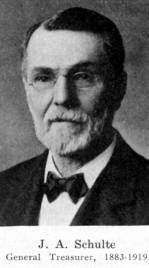Chapter VII
The General Missionary Society
"That ye stand fast in one spirit with one soul striving for the faith of the gospel." Phil. 1:27.
In a previous chapter the statement was made that the General Missionary Society was the most potent and central of all the larger general organizations our German churches have effected, for through it the various missionary activities of the churches have been unified and are now finding an adequate expression. But this unification was not accomplished until 1888, when representatives of the four local conferences then existing met at Indianapolis, Ind., to draft resolutions and outline a constitution for a general missionary body. This action was ratified by the General Conference meeting at Cleveland, O., in the fall of the same year, thereby founding the Society. The present year therefore marks the forty-first milestone in the activities of the latest of our three general organizations, and the gratifying success it has attained in those years is surely sufficient reason for its necessity and utility.
And still it seems singular to us of more modern days, that for more than thirty years our churches should have chosen another way of carrying on this most important work. Yet, thereby hangs a story not at all uncommon in Baptist polity and procedure. The one outstanding reason for the delay in unifying our missionary interests was the fact, already mentioned in a previous chapter, that every local conference was by its very constitution a missionary body and was giving first attention to the special needs and opportunities in its own field. It was a matter scarcely debatable for a long time, that these opportunities could best be known, discussed and acted upon by each conference itself. When, therefore, the idea of a p05sible unification of the missionary interests was broached, the fundamental difficulty that presented itself was, how the initiative and judgment of any local conference in the matter of its own mission fields could be preserved. The discussion over this question waxed warm in many conference sessions. It was debated pro and con in the "Sendbote" of the year 1882 in many animated articles, which even today offer very interesting reading. Some of the good brethren conjured up many difficulties which, to say the least, were very remote. A few men were afraid that the general direction of the missionary interests would slide into the hands of a few men, and they wanted neither a "pope" nor a few self-constituted "bishops;" others feared for the independence of the German churches, if they should come too much under the influence of the Home Mission Society.
But the brethren of forty-one years ago found a happy way out of this "great" difficulty and adopted a plan which, on the one hand is a gem in its simplicity, and on the other, is more democratic and responsive to the churches than any other which has been consummated. The plan is, that each conference elects its own Missionary Committee as it was wont to do, but empowers one or two of its members (gauged by the numerical strength of the Conference) to sit in counsel with a like number from every other local conference, and these thereby constitute a General Missionary Committee. To the General Missionary Committee is delegated the power of appointing, supervising and sustaining the missionaries on the entire mission field of the churches, and to transact any other business of a general nature. The General Conference on the other hand elects the General Missionary Secretary and the General Treasurer, for the term of three years.
This General Missionary Society has been incorporated under the laws of the State of New York under a statute which allows it full freedom in carrying on its varied activities. In the course of the years these activities have grown in numbers and have become much diversified, but, with slight additions to the original constitution, these have been added without friction. The dangers from too much centralization in the most important department of the general work, which the "fathers" feared, have not materialized. Indeed, the only possible friction would lie in an attempt of the General Missionary Committee to override the expressed decision of any local conference.
It seems to have been a most opportune time in the history of our German Baptist churches when this unification of our mission interests was completed, for the favorable impact of it made itself felt almost immediately. In the late eighties and early nineties successive waves of German immigration from Russia and Roumania were moving toward the Dakotas, Kansas and Nebraska, and new missionary centers were opening up by the score. There has scarcely been a period in the entire history of our churches when the call for men and money, for these invariably are the necessary factors in an aggressive missionary undertaking, was so insistent; but unhappily both were not forthcoming in a manner that measured up to the needs. There was earnest prayer in our gatherings then for "harvesters." Here was the first test for a united forward movement and splendidly did our churches respond to it with the men and means at their command. A few figures from the statistical tables tell an impressive story. In 1883 our records show a total of 138 churches with a membership of 10,899; three years later there were 161 churches and a gain in membership of more than 2000. The Home Mission Society in 1882 had aided the German churches in the sum of about $6600, but in 1886 their German budget called for $16,000. The missionary collections in our own churches show a corresponding advance. And so it has gone on, not indeed uniformly, during the past forty years, but surely the home mission movement under a centralized, careful direction has not retrograded.

It may be well to gain a bird's eye view of the various departments which today represent the activities of the Society of which we are now thinking.
1. Home Missions and Evangelism
This has ever had the first consideration. Under this department there are supported: 79 missionary pastors, 2 Evangelists, and 2 Secretaries for Young People's and Sunday School Work; 3 colporteurs and 14 women missionaries are supported either wholly or in part. This department makes provision also for aiding churches in the building of chapels by direct grants or loans. It gives a small yearly stipend to aged ministers who have left the active ministry. Through a special Committee it has established a Ministerial Pension Bureau, the funds for which undertaking are now being collected. It has supervision of large funds which have been very liberally spent in recent years for the war sufferers in Europe. The income necessary for the department, without the extra expenditure for war sufferers which alone claimed more than $300,000 during the past three years, is $160,000 yearly.
2. European Missions
This department makes a special appeal for assistance at the present time, for the German speaking churches on the war's eastern front in Poland, Russia, Esthonia, Latvia und Romania have suffered indescribable losses and some of them have been annihilated. The scattered and torn remnants are appealing to our churches as their only source to help them begin again. This appeal can not be ignored. The General Missionary Society consequently is supporting wholly or in part at the present time: 12 missionaries in Siberia, 81 in Poland, 15 in Bulgaria among a number of nationalities, and one each in Romania, Esthonia and Hungary. In Switzerland 8 pastors are being aided and in Germany 10 colporters receive assistance. The present circumstances in Germany have made it possible to grant loans to sister Baptist churches there by means of which the debts on their houses of worship could be lifted; in some instances liberal grants were made for building chapels in strategic centers.
3. Foreign Missions
The interest in the great needs of Europe at the present time have not entirely eclipsed the warm interest our churches have ever felt in distinctively foreign missions, but the expenditures for the "regions beyond" have necessarily fallen off. With the transfer of the German colonies in the Cameroons, in Western Africa, to France and England, one of the most flourishing and promising mission fields of modern times has been cut off from our help with no immediate prospect of restoration. The General Missionary Society must content itself for the present with aiding the Foreign Missions of the American Baptists to the extent of paying the salaries of those missionaries who have gone out from our German churches and who are now serving under that Society in China, India and the Philippines.
The program just outlined, when compared with that of forty years ago, shows the vast progress which has been made during this time. It is the program of our German churches working in unison for a great cause. To carry out this program successfully requires large sums of money-
$225,000 yearly, or the equivalent of six dollars and a half per member for missions alone It also requires wise planning and direction of no mean order, and above all, it requires the spiritual vision in the rank and file of the membership which makes sacrifices the law of giving and service; for if that fails, all is lost. Thus far the record is full of cheer and a great aid to faith, which oftentimes needs the stimulation of figures and a great objective to raise its temperature.

We ought to write a concluding word concerning the men who have been elected to the positions of directing the activities of the General Missionary Society since 1883. There have been only two General Treasurers and one of them, J. A. Schulte, served from 1888 to 1919, when age compelled him to lay down his busy pen. There never was a more painstaking and conscientious treasurer than this man, and the denomination owes him a debt of gratitude it can never repay. lie never was a maker of phrases, but he served his Master and the denomination, who kept him in office for 36 years, in his quiet, unobtrusive way, thereby showing that in the. Master's great work-field the most varied gifts can find a place of honor, if only they are consecrated to his service. The present treasurer is W. F. Grosser, a man well known for his business ability and his hearty co-operation in the interests of our German churches. There have been three General Secretaries, J. C. Grimmell, serving from l883 to 1892, G. A. Schulte, from 1892 to his death in 1916, and the present incumbent, William Kuhn.
Those who are in a position to follow somewhat closely the trend of any large organization, religious or otherwise, know well that, even under the most democratic conditions, very much depends upon the invisible spiritual qualities of him who heads the organization. A real leader's life is often expended in his work and so the organization becomes a good part of himself. Our denomination has been exceedingly fortunate in the men who became its General Secretaries and also in him who now fills that position. How very different in personality and varied in gifts and attainments, but how singularly devoted they all have been. But G. A. Schulte, [Baptist Herald, February, 1923.] more than his predecessor, by reason of his long and patient service, his steadfast devotion, his wisdom and tact, has put his stamp upon this big society of ours.
It remains to be said that our German churches during these later years have become self-supporting, carrying on their local and their general missionary activities without any pecuniary assistance from any other missionary society.